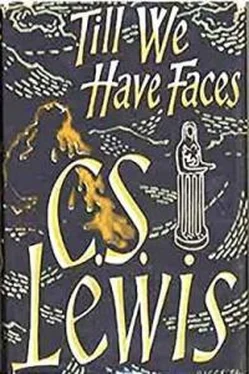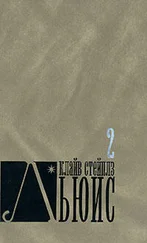“Orual,” said she, now at her queenliest, “I have never told you a lie in my life.”
I tried to soften my manner. Yet the words came out cold and stern. “No, you don’t mean to lie. You’re not in your right mind, Psyche. You have imagined things. It’s the terror and the loneliness … and that drug they gave you. We’ll cure you.”
“Orual,” said she.
“What?”
“If it’s all my fancy, how do you think I have lived these many days? Do I look as if I’d fed on berries and slept under the sky? Are my arms wasted? Or my cheeks fallen in?”
I would, I believe, have lied to her myself and said they were, but it was impossible. From the top of her head to her naked feet she was bathed in life and beauty and well–being. It was as if they flowed over her or from her. It was no wonder Bardia had worshipped her as a goddess. The very rags served only to show more of her beauty; all the honey–sweetness, all the rose–red and the ivory, the warm, breathing perfection of her. She even seemed (“But that’s impossible,” I thought) taller than before. And as my lie died unspoken she looked at me with something like mockery in her face. Her mocking looks had always been some of her loveliest.
“You see?” she said. “It’s all true. And that—no, listen, Maia—that’s why all will come right. We’ll make—he will make you able to see, and then——”
“I don’t want it!” I cried, putting my face close to hers, threatening her almost, till she drew back before my fierceness. “I don’t want it. I hate it. Hate it, hate it, hate it. Do you understand?”
“But … Orual … why? What do you hate?”
“Oh, the whole—what can I call it? You know very well. Or you used to. This, this——” And then something she had said about him (hardly noticed till now) began to work horribly in my mind. “This thing that comes to you in the darkness … and you’re forbidden to see it. Holy darkness, you call it. What sort of thing? Faugh! it’s like living in the house of Ungit. Everything’s dark about the gods … I think I can smell the very … ” The steadiness of her gaze, the beauty of her, so full of pity yet in a way so pitiless, made me dumb for a moment. Then my tears broke out again. “Oh, Psyche,” I sobbed, “you’re so far away. Do you even hear me? I can’t reach you. Oh, Psyche, Psyche … you loved me once … come back. What have we to do with gods and wonders and all these cruel, dark things? We’re women, aren’t we? Mortals. Oh, come back to the world. Leave all that alone. Come back where we were happy.”
“But Orual—think. How can I go back? This is my home. I am a wife.”
“Wife? Of what?” said I, shuddering.
“If you only knew him,” she said.
“You like it! Oh, Psyche!”
She would not answer me. Her face flushed. Her face, and her whole body, were the answer.
“Oh, you ought to have been one of Ungit’s girls,” said I savagely. “You ought to have lived in there—in the dark—all blood and incense and muttering and the reek of burnt fat. To like it … living among things you can’t see … dark and holy and horrible. Is it nothing to you at all that you are leaving me … going into all that … turning your back on all our love?”
“No, no, Maia. I can’t go back to you. How could I? But you must come to me.”
“Oh, it’s madness,” said I.
Was it madness or not? Which was true? Which would be worse? I was at that very moment when, if they meant us well, the gods would speak. Mark what they did instead.
It began to rain. It was only a light rain, but it changed everything for me.
“Here, child,” said I, “come under my cloak. Your poor rags! Quick. You’ll be wet through.”
She gazed at me wonderingly. “How should I get wet, Maia,” she said, “when we are sitting indoors with a roof above us? And ‘rags’?—but I forgot. You can’t see my robes either.” The rain shone on her cheeks as she spoke.
If that wise Greek who is to read this book doubts that this turned my mind right round, let him ask his mother or wife. The moment I saw her, my child whom I had cared for all her life, sitting there in the rain as if it meant no more to her than it does to cattle, the notion that her palace and her god could be anything but madness was at once unbelievable. All those wilder misgivings, all the fluttering to and fro between two opinions, was (for that time) quite over. I saw in a flash that I must choose one opinion or the other; and in the same flash knew which I had chosen.
“Psyche,” I said (and my voice had changed). “This is sheer raving. You can’t stay here. Winter’ll be on us soon. It’ll kill you.”
“I cannot leave my home, Maia.”
“Home! There’s no home here. Get up. Here—under my cloak.”
She shook her head, a little wearily.
“It’s no use, Maia,” she said. “I see it and you don’t. Who’s to judge between us?”
“I’ll call Bardia.”
“I’m not allowed to let him in. And he wouldn’t come.”
That, I knew, was true.
“Get up, girl,” I said. “Do you hear me? Do as you’re told. Psyche, you never disobeyed me before.”
She looked up (wetter every moment) and said, very tender in voice but hard as a stone in her determination, “Dear Maia, I am a wife now. It’s no longer you that I must obey.”
I learned then how one can hate those one loves. My fingers were round her wrist in an instant, my other hand on her upper arm. We were struggling.
“You shall come,” I panted. “We’ll force you away—hide you somewhere—Bardia has a wife, I believe—lock you up—his house—bring you to your senses.”
It was useless. She was far stronger than I. (“Of course,” I thought, “they say mad people have double strength.”) We left marks on one another’s skin. There was a thick, tangled sort of wrestling. Then we were apart again; she staring with reproach and wonder, I weeping (as I had wept at her prison door), utterly broken with shame and despair. The rain had stopped. It had, I suppose, done all the gods wanted.
And now there was nothing at all left that I could do.
Psyche, as always, recovered herself first. She laid her hand—there was a smear of blood on it; was it possible I could have scratched her?—across my shoulder.
“Dear Maia,” she said, “you have very seldom been angry with me in all the years I can remember. Don’t begin now. Look, the shadows have already crept nearly all the way across the courtyard. I had hoped that before this we should have feasted together and been merry. But, there—you would have tasted only berries and cold water. Bread and onions with Bardia will be more comfort to you. But I must send you away before the sun sets. I promised that I would.”
“Are you sending me away for ever, Psyche? And with nothing?”
“Nothing, Orual, but a bidding to come again as soon as you can. I’ll work for you here. There must be some way. And then—oh, Maia—then we shall meet here again with no cloud between us. But now you must go.”
What could I do but obey her? In body she was stronger than I; her mind I could not reach. She was already leading me back to the river, back through the desolate valley she called her palace. The valley looked hideous to me now. There was a chill in the air. Sunset flamed up behind the black mass of the saddle.
She clung to me at the very edge of the water. “You will come back soon, soon?” she said.
“If I can, Psyche. You know how it is in our house.”
“I think,” said she, “the King will not be much hindrance to you in the next few days. Now, there’s no more time. Kiss me again. Dear Maia. And now, lean on my hand. Feel for the flat stone with your foot.”
Читать дальше











